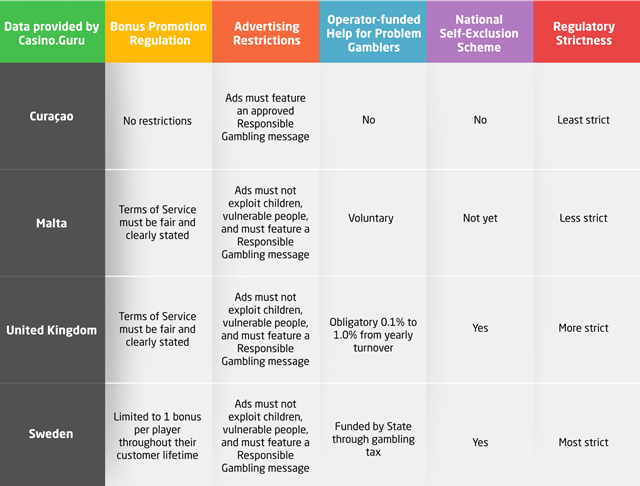Something is brewing in the space of Africa’s gambling regulation. As its long-standing problems worsen and COVID-19 forces the industry’s move online, countries have no choice but to embrace change. What worked yesterday won’t work tomorrow. And so, as the Scorpions would sing, the regulators of tomorrow dream away in the Wind of Change.
Predicting the future of any regulation is difficult. But if you’re creating it, it’s a bit different. So, in hopes of creating a better regulatory future in Africa, we chose to compare four well-established regulators. We looked at the similarities that tie them together and at the differences that set them apart. What follows are the things we learned, and the things Africa can hopefully learn from too.
We thank Casino Guru for helpfully providing us with most of the insights and information used in this article. It wouldn’t be possible without their expertise.
1) Curaçao’s Gambling Control Board is one of the world’s oldest modern regulators. It was the first to regulate online gambling. It’s known for its operator-friendly approach, but notorious for its lax regulation. Its specialty is licensing offshore operators.
2) Malta’s Gaming Authority is a well-established and popular regulator/licensing entity. Compared to Curaçao, it’s stricter and more interested in supporting responsible gambling practices, though it is still quite operator-friendly.
3) Great Britain’s Gambling Commission is a global trendsetter in terms of gambling legislation. It’s very player-oriented, has strict regulation, and puts great emphasis on responsible gambling practices.
4) Sweden’s Spelinspektionen is one of the world’s youngest regulators, established only in early 2019. It’s the strictest out of these four regulators. It governs Sweden’s land-based casino monopoly and licenses only online casino providers.
We looked at these four operators in the context of regulation in the following four categories:
- Bonus Promotions
- Advertising Restrictions
- Responsible Gambling Self-Exclusion Schemes
- Funding Local Problem Gambling Treatments

1) Bonus Promotions
Bonus promotions are a notoriously tricky subject in any regulation. They include a wide variety of local and remote casino bonuses, like welcome bonuses, no-deposit bonuses, loyalty bonuses, etc. Casino operators use promotions to attract new players and re-engage existing ones.
Unfortunately, casinos tend to use them in unfair ways to win over players’ favor, while still filling their own pockets. That’s where regulators come in.
Common casino bonus regulations:
- The Terms of Service must be clear and plainly state all relevant restrictions and requirements
- During sign-up, players must explicitly agree with the Terms of Service
- Players need to be able to view the Terms of Service anytime they like
- Players should be able to monitor their progress throughout the bonus’ duration
- If a player breaks the Terms of Service, the operator must inform them and offer adequate reasoning behind the decision
Country-specific casino bonus regulations:
- Curaçao does not regulate bonuses in any way.
- Malta requires operators to get a second objective opinion on a player’s breach of the Terms of Service before invalidating their winnings.
- Great Britain requires online casinos to display the player’s deposit and bonus balance independently from each other.
- Sweden limits players to a single bonus throughout their lifetime.
In this case, there are two extremes – Curaçao and Sweden. Curaçao’s hands-off approach lets operators engage in various predatory tactics, and Curaçao has a bad name because of it. Meanwhile, in Sweden, bonus hunters tend to avoid playing in locally licensed casinos because foreign operators can offer them better deals. The fewer players there are, the less revenue the casinos earn, which means the government gets less casino tax money.
Africa’s takeaway:
There is such a thing as too much, even if it is “too much” of a good thing. When it comes to bonus promotions, African regulators will have to be very careful with balancing the regulation. Otherwise, they risk it becoming too one-sided.
2) Advertising Restrictions
It goes for many industries and it goes for gambling as well – Marketing is king. Casinos use advertising to get as many people through the door/log-in screen. And unsurprisingly, they don’t have a great history of doing it responsibly. So, regulators did what regulators do. They started to regulate advertising.
Common advertising restrictions:
- Advertising can’t target minors or other vulnerable individuals
- Advertising mustn’t portray, condone nor encourage irresponsible gambling
- Advertising has to feature a prominent responsible gambling message
- Advertising can’t suggest gambling is a suitable form of escapism
- Advertising mustn’t suggest that gambling can improve an individual’s personal qualities (popularity, sex appeal, toughness, etc.)
Country-specific restrictions:
- Curaçao only has a single restriction. It requires casino ads to feature a responsible gambling message approved by the Gaming Control Board.
- Great Britain banned all animated casino ads. It requires broadcast ads to air only after 10 PM.
Africa’s takeaway:
Gambling ads have been linked to problem gambling. Regulators should want to limit the negative effect it has on children and other vulnerable individuals. For that reason, they will have to create clear rules for operators’ advertising activities.
3) Responsible Gambling Self-Exclusion Schemes
For those who are unaware, a self-exclusion scheme is a program that allows players to ban themselves from gambling for a set amount of time. Self-exclusion schemes come in two varieties – single-operator and national (also known as multi-operator schemes). There is currently no such thing as a global self-exclusion scheme. Though it may be only a question of time, as suggested by Casino Guru’s Global Self-exclusion Initiative.
Self-exclusion schemes are important because they allow at-risk gamblers to stop playing before it’s too late. Unfortunately, they’re often difficult to put into practice. Operators worry that self-exclusion harms their business by driving away loyal customers. But can you really put a price on the health and safety of your customers?
Common self-exclusion scheme requirements:
- Self-excluded players mustn’t enter gambling venues (land-based or remote)
- Self-excluded players who are found gambling have to be removed from the venue/platform
- Operators mustn’t advertise to self-excluded players
- Players can’t end their self-exclusion early
- Operators have to have a self-exclusion scheme set up
Country-specific self-exclusion rules:
- Curaçao has no national self-exclusion scheme but has an “involuntary exclusion list”. All self-excluded players caught gambling are placed on the involuntary exclusion list and banned from gambling for up to 5 years.
- Sweden has a monopoly on its land-based casino industry, so its single-operator scheme is also its national scheme. Sweden’s online casino industry is more varied, as it licenses foreign operators, who are obligated to offer single-operator schemes, as well as comply with the multi-operator Spelpaus
Africa’s takeaway:
Self-exclusion is an important part of responsible gambling for any regulation. However, significant effort is needed to make it effective. For that reason, regulators should start small with only requiring single-operator schemes and slowly work their way up to national solutions.
4) Funding Local Problem Gambling Treatments
Gambling, much like any other vice, can cause a great deal of damage to susceptible individuals. Debt, breakdown of a player’s social or professional life, depression, anxiety, and suicide are just a few of its many negative impacts. For that reason, governments need to invest in providing these individuals with the treatments they need. And where better to find the funds for the solutions to this issue than the industry that is directly responsible for it?
Country-specific problem gambling funding solutions:
- Curaçao’s operators pay a 2% tax, they must hand over the winnings and deposits from self-excluded players to the Gambling Control Board, they do not have to donate anything extra on top of that.
- Malta’s operators pay a 5% tax, Malta’s Social Causes Fund accepts donations from any willing benefactors, benefactors can choose their donations to be used in a particular way, struggling individuals and organizations can apply for funding from the Social Causes Fund, there are no obligatory donations.
- Great Britain’s operators pay a 15% tax, they must donate between 0,1% to 1,0% of their yearly Gross Gaming Yield to fund UK’s problem gambling solutions.
- Sweden’s taxes are variable depending on the operator’s yearly turnover, problem gambling solutions are entirely funded through tax, there are no additional obligatory donations.
Africa’s takeaway:
As shown by the regulators’ various approaches to the subject, it’s clear that there are many ways of funding problem gambling solutions. What’s important is for African regulators to choose a reliable source of funds and use them in a good way.
In closing, we trust our local governments to have the players’ best interest in mind while designing future legislation. We hope this article was informative for both the uninitiated and the potential officials, who can make a positive change in Africa’s regulation.
Do you have a story in your community or an opinion to share with us: Email us at editorial@watchdoguganda.com









